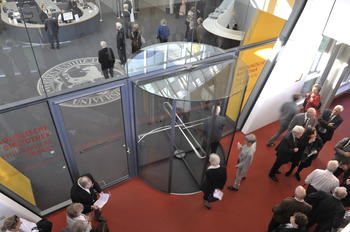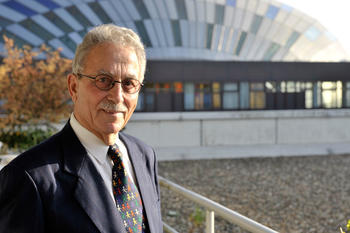A Springboard to the World
Celebrations honor 57 people to mark the 50th anniversary of earning their doctorates at Freie Universität
Dec 20, 2012
The Philological Library, designed by Lord Norman Foster, was one of the highlights of a tour through the humanities building complex.
Image Credit: Bernd Wannenmacher
Fifty years later: Reinhard Yoav Freiberg, who earned his doctorate in 1962 from Freie Universität, was the keynote speaker at the golden anniversary reunion.
Image Credit: Bernd Wannenmacher
A generation tasked with providing a fresh start: Those who, like Reinhard Yoav Freiberg, earned their doctorates at Freie Universität in 1962, had grown up in a climate of racial hatred, had seen persecution and destruction – and many of them made it their mission to fight those issues in some way. “We left the university committed to the principles of democracy,” says Freiberg, a political scientist and publicist. In a speech delivered to an audience of 56 others who were celebrating a few weeks ago the 50th anniversary of earning their doctorates, Freiberg looked back on his early years and on his career, which took him to the international offices of the children’s aid organization UNICEF.
After finishing his studies, Freiberg, a Berlin native, devoted himself to improving living conditions for children. “I was born in a difficult era into a family with French Huguenot and German Jewish roots, and I wanted to do something positive for a number of reasons, including in light of the situation in the Middle East,” Freiberg explains.
The basis for these activities was Freiberg’s studies of public relations, political science, international law, and Romance languages and literatures, which he began at Freie Universität in 1956. That made Freiberg, speaking at Sunday’s event, one of the few scholars of the humanities in the doctoral class of 1962. More than half of them had studied at the university’s school of medicine, what is now Charité – Universitätsmedizin Berlin.
Freiberg, for his part, took a job at UNICEF’s European offices, in Paris, at the age of 25 and “without any actual work experience,” as he puts it. And he did so without going through the Habilitation process, which his professor had hoped he would do. He would go on to spend more than 30 years working for the children’s aid organization in fields including public relations.
Standing still remains unthinkable to the 75-year-old Freiberg to this day – after a career involving travel to more than 100 countries all over the world and stints working in Paris, Santiago de Chile, New York, and Geneva. He studied eight languages – and uses them frequently to this day. After retiring, Freiberg spent another ten years volunteering as a consultant at the Harry Truman Research Institute at The Hebrew University of Jerusalem, which engages in projects with children, adolescents, and educators with various goals in mind, including fostering a positive, peaceful environment for children in Israel and Palestine. Freiberg spends most of his time in Jerusalem, Rome, and Paris these days – he has not lived in a German-speaking country since his days as a student.
Still, Freiberg describes his youth in Berlin as formative: his years at the farm-based school on Scharfenberg Island, in Lake Tegel, alongside his time as a student at Freie Universität. “What I learned back then helped me tremendously later on, in many situations over my life – not only in terms of languages, but also as regards the substance and the political interest.”
Freiberg still speaks warmly of the “fantastic professors” who encouraged him in the choice of his dissertation subject. He was studying the underground press in the French Resistance movement during the German occupation of France – a topic that no one had yet considered at the time. His work was graded “magna cum laude”: “I don’t know myself how I managed that,” he adds with a laugh. “Back then, there were no students with money. We were all dependent on grants and scholarships, and we had to keep applying and reapplying. And we were well aware what an honor it was to be allowed to earn a doctorate,” he recalls.
For Freiberg, returning to his alma mater for the anniversary celebrations and seeing his fellow students from back then is also a return to a long-closed chapter of his life. He visits Berlin for a few days each year, enjoying “the city’s rich cultural offerings in every respect.” But moving back to Berlin is out of the question. “I have always felt right at home where I was living at the time.”


